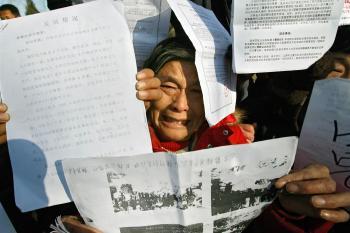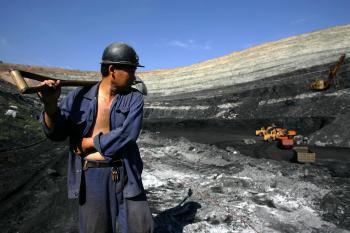In 2008, the Chinese regime logged a 19.5 percent increase in governmental income, which outpaced its stunning, official 9 percent GPD growth by 2.2 times.
This 19.5 percent growth in government income is slower than the increase of recent years. For example, government income enjoyed an increase of 31 percent in 2007, and an increase of 24.5 percent in 2006.
Some people blame the financial problems facing Chinese local governments on the slower growth in income in 2008.
However, the years of rapid increase in government income, fueled by the CCP’s unchecked power in China, have transformed CCP officials into one of the most luxurious groups of governmental officials in the world. The officials have been expanding their expenses to keep up with the dramatic rise in government income, while avoiding burdening the government with any significant new social welfare programs for the ordinary Chinese people.
For those CCP officials, whose expenditures had been aligned with a 31 percent increase, an increase of only 19.5 percent may require them to make some uncomfortable adjustments in their spending habits this year.
Grey Income
But the real reason for the financial problems of Chinese local governments does not lie with the slow down in the local governments’ official income. The real reason is because of the dramatic reduction in one major source of their “grey income”: money made by selling local land to real estate developers.
Chinese law prohibits individuals from owning land privately. China’s land is owned either by “all of the people” or by “a group of people.” In plain language, “all of the people” generally means the Chinese regime’s local governments, which refers to themselves as the representatives of “all of the people.” In contrast, “a group of people” in many cases refers to a village of farmers.
According to China’s law, for the sake of the “public interest,” the local government has the right to acquire a particular piece of land owned by the farmers with the amount of compensation essentially decided by the local governmental officials. Whenever a real estate developer wants to start a residential housing project, the builder needs to pay the local governments to gain the right of using the land for a 70-year term.
Chinese local governments generally use a bid procedure to find out the highest offer for a particular piece of land among all of the interested builders. When the real estate market was booming, the increasing housing prices boost the land prices, which in turn boost the housing prices.
While Chinese people complain of the explosive increases in housing prices, the CCP’s local governments have pocketed a boat load of money by selling the local lands. Since this income was not officially counted as government income, it is thus considered as local governments’ “grey income.”
In many places, the volume of this source of grey income is indeed huge, and can account for up to 60 percent of local governments’ total expenses. That the CCP officials are very eager to initiate large construction projects is widely known, because those projects can significantly expand the local GDP, along with the officials’ own income.
In fact, most of the large local construction projects are funded by the money made by selling the land. For example, Shijiazhuang, the capital of Hebei province, planned to spend $20.5 billion in 2008 on various construction projects, which were supposed to be funded by the money made by selling more land to real estate developers in the same year.
Patriotic Duty
With a sudden downturn in China’s real estate market in early 2008, many local governments were caught by surprise. For the first time, they found almost no builder was interested in their land. The developers’ money is sunk in the unsold houses, and they just do not have enough money to buy more land and start new construction projects.
Failing to sell the land has a devastating effect on local governments’ financial conditions, and many on-going construction projects immediately lose their sources of funding. Some local officials are so desperate to revive the real estate markets that they have begun propaganda campaigns to motivate local people to buy new houses, claiming that buying a house was now a patriotic act. However, local governments still do not see enough serious bidders to push up their land prices.
The local governments dare not dream that the CCP’s central government will give them any bailout money, since the central government also needs a lot of money to pay for their various new spending initiatives, including a $6.4 billion plan to transform CCP’s mouthpiece CCTV into a Chinese version of CNN tasked with improving the CCP’s global image.
However, because the CCP has unchecked power inside China, it can always help local governments with favorable policy. On May 27, the CCP’s state council suddenly announced that the minimum capital required for a builder to start a residential housing project would be reduced from 35 percent of the total project cost to 20 percent. In other words, originally a builder needed to have at least $35 million in hand before they could go to banks to borrow money for a $100 million real estate project. Now, the builder can start the same project when they only have $20 million in hand.
The CCP’s state-run media praised this new policy for dramatically lowering the barrier for new developers to enter the real estate construction industry, and said this policy was equivalent to injecting an extra $44 billion into China’s real estate industry. The primary beneficiaries of this policy will be the local governments—the owners of the land. They will very likely start seeing more bidders when they put a for-sale sign on a piece of land.
Once their land-selling business is back on track, the financial problems they are currently facing will be gone. As for the concern that this policy can further inflate China real estate’s bubble, CCP’s officials are not concerned. They would like to believe they can always prevent the bubble from bursting by manipulating ordinary people via their media and statistics, as they have been successfully doing so far.
This is a clever move by the CCP. Without paying a penny, it has helped to lift local governments out of the financial holes they had dug for themselves. Of course, a new policy by itself does not create any money. The bill will again be paid by the ordinary Chinese people, because higher land prices will be reflected as higher housing prices in the future. When the housing bubble finally bursts, the losers will be ordinary Chinese, while the money stays in the pockets of CCP officials.



